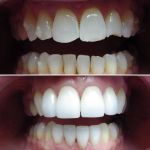What is a Dental Veneer and How Does it Work?
- 1. What are Dental Veneers?
- 2. How Do Dental Veneers Work?
- 3. Benefits of Dental Veneers
- 4. Types of Dental Veneers
- 5. Dental Veneers vs Other Dental Treatments
- 6. Real-life Examples of Dental Veneers
- 7. Considerations Before Getting Dental Veneers
- 8. How to Maintain Dental Veneers
- 9. Dental Veneers Purchase Guide
1. What are Dental Veneers?
Dental veneers are thin, custom-made shells designed to cover the front surface of your teeth. They are commonly used to improve the appearance of teeth that are stained, chipped, misaligned, or have gaps between them. These veneers can be made from porcelain or composite resin, both offering a durable and aesthetically pleasing solution for dental imperfections.
2. How Do Dental Veneers Work?
Dental veneers work by adhering directly to the surface of your teeth, creating a smooth, natural-looking appearance. The process begins with your dentist preparing your teeth by removing a small layer of enamel. Next, they take impressions of your teeth to create custom veneers. Once these are made, they are carefully bonded to the teeth using a strong adhesive. This procedure is typically quick, and the result is an immediate improvement in your smile.
3. Benefits of Dental Veneers
There are numerous benefits to getting dental veneers, including:
- Improved appearance of teeth with stains, chips, or misalignment
- Durability and longevity, lasting for many years with proper care
- Minimal maintenance required
- Quick procedure with fast results
4. Types of Dental Veneers
There are two main types of dental veneers:
- Porcelain Veneers: Known for their durability and natural appearance, porcelain veneers are often preferred for those seeking a long-term solution.
- Composite Resin Veneers: These are more affordable but less durable than porcelain. They are a great option for those on a budget or who need minor aesthetic corrections.
5. Dental Veneers vs Other Dental Treatments
Dental veneers offer advantages over other dental treatments such as crowns and bonding:
- Dental Crowns: Crowns cover the entire tooth, which may require more tooth removal. Veneers, however, only cover the front, preserving more of the natural tooth.
- Dental Bonding: Bonding is a less expensive option but does not offer the same level of durability or aesthetic appeal as veneers.
6. Real-life Examples of Dental Veneers
Many celebrities and public figures have turned to dental veneers to achieve a flawless smile. For example, the famous actress, Julia Roberts, has often been cited for her perfect, radiant smile, which many believe is thanks to veneers. While dental veneers have become more common in Hollywood, they are also a practical and accessible option for many individuals seeking a smile makeover.
7. Considerations Before Getting Dental Veneers
Before deciding to get dental veneers, there are several factors to consider:
- Are you looking for a long-term solution, or a temporary fix?
- Do you have enough healthy enamel for veneers?
- Are you ready for the permanent changes to your teeth that come with veneers?
It’s always best to consult with a professional dentist to ensure veneers are the right option for you.
8. How to Maintain Dental Veneers
Maintaining your veneers is easy and involves regular brushing and flossing, avoiding hard foods, and scheduling regular dental check-ups. Although porcelain veneers are resistant to stains, composite veneers may require touch-ups or repairs over time. Proper care can help extend the life of your veneers and keep your smile looking great.
9. Dental Veneers Purchase Guide
If you're considering getting dental veneers, it's important to choose the right provider. Look for a dentist who specializes in cosmetic dentistry and offers personalized solutions. You should also review prices, materials, and aftercare services to ensure you're getting the best value for your investment. Want to find out more about our latest selection of dental veneers? Click here to learn more!







 Happy Dental Land multi dental Specialty3.0 (58 review)
Happy Dental Land multi dental Specialty3.0 (58 review) Wonderful Smiles - Puyallup Dentist4.0 (115 review)
Wonderful Smiles - Puyallup Dentist4.0 (115 review) Eastern Dental4.0 (1033 review)
Eastern Dental4.0 (1033 review) Gwynedd Family Dentistry4.0 (98 review)
Gwynedd Family Dentistry4.0 (98 review) Smile Central Dental4.0 (506 review)
Smile Central Dental4.0 (506 review) McDonough Dental Studio4.0 (685 review)
McDonough Dental Studio4.0 (685 review) The Importance of Oral Health Education During Pregnancy for a Healthy Pregnancy
The Importance of Oral Health Education During Pregnancy for a Healthy Pregnancy Best Tips for Brushing Your Teeth Properly for Healthy Gums: Essential Techniques for Oral Health
Best Tips for Brushing Your Teeth Properly for Healthy Gums: Essential Techniques for Oral Health Why Skipping Dental Checkups Can Lead to Bigger Oral Health Problems
Why Skipping Dental Checkups Can Lead to Bigger Oral Health Problems Advantages of Porcelain Dental Restorations
Advantages of Porcelain Dental Restorations How Can Diabetes Cause Tooth and Gum Problems? Preventing and Managing Oral Health Issues
How Can Diabetes Cause Tooth and Gum Problems? Preventing and Managing Oral Health Issues Healthy Habits for Promoting Good Oral Health and Hygiene: Tips for a Healthy Smile
Healthy Habits for Promoting Good Oral Health and Hygiene: Tips for a Healthy Smile